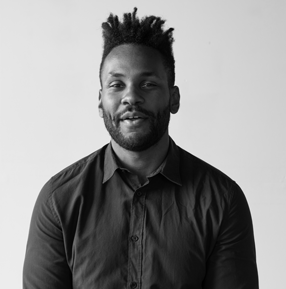The Broken Man’s Permission
A crocodile slips its earth-toned body
back into the river, in silence, violence down
and for its nightness
I cannot see the water. With fear
I am alone. Slick rocks smile thin anonymous light, they lie
about what I am. I see and try to hold
my body in my body, trace a vein
from the base of my palm through
the crook of my elbow, armpit, home—home
makes no sense. I've given up on what I know.
This blindness is a mirror turning
back to sand still hollowed, where
every sound is amplified. I want to be the crocodile’s
stomach that is my father, teeth
that are my mother, vertebrae
that aggregate the spine that are loves, knuckled
angles casing nerves. It’s me wading around
inside, mouth open. A humid numbness dense, low,
beneath the undertow: hands that coax and claim
my scaled neck, soothe and pull
each knotted shoulder. I give in to a third of moon caught
in cloud, its orange-grey halo drawn away
from what can be named, known. A curse and prayer
to go unchanged within this water, my movement
foreign, a rootless gurgle, flit of river vines
caging the dwindling
river’s brutal bed, the gorge, flushed
with new food: the blue heron’s bone-flight collapsed,
tangled feathers along the mudglut bank’s
saliva, lifting like shame in the open.
Copyright © 2018 by Aaron Coleman. Originally published in Poem-a-Day on July 11, 2018, by the Academy of American Poets.
“‘The Broken Man’s Permission’ is born out of the emotional awareness that comes after crisis, or during failure. I wrote this while thinking about what it means to be a black cisgender man in our current cultural moment. It feels important not to look away from all the ways that masculinity is broken and to take the next step in thinking deeply and compassionately about not just what to do, but how to be. For me, that process has to do with looking back on my own past—my memories and imagination—and finding ways to transform those feelings into ingredients for insight, genuine connection, and growth. Maybe this poem is trying to find a way to witness a black man’s body in new terms. The poem grants its own permission to embrace masculinity’s vulnerability and imperfections, and as Tagore said, ‘my wounds and also my healing.’”
—Aaron Coleman

